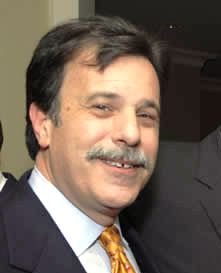 I haven’t done any blogospheric naval gazing since I started writing on personal injury law in November 2006, since that isn’t what my blog is about. But Dave Hoffman at Concurring Opinions just wrote on The Flat Legal Blogosphere And What to Do About It, and I’d like to hit a few points despite the fact I’m just a rookie.
I haven’t done any blogospheric naval gazing since I started writing on personal injury law in November 2006, since that isn’t what my blog is about. But Dave Hoffman at Concurring Opinions just wrote on The Flat Legal Blogosphere And What to Do About It, and I’d like to hit a few points despite the fact I’m just a rookie.
First, read his post at the link above and then come back.
Welcome back (and yes, I stole his naval gazing graphic). Hoffman’s comments in red and mine in black:
Group Blogs Do Not Predominate: Unlike the political blogosphere, the one-person operation remains a very important part of the short- and the long-tail of the blogosphere. Among the highest traffic sites are many run by one individual (Berman, Bainbridge, Leiter, Caron, Ribstein, Althouse/Reynolds (if the last two count as law bloggers). Others are run as groups (Scotusblog, Balkinization, Volokh, CO, Prawfs, Discourse, Conglomerate). But there is no clear trend, as I once predicted, toward further consolidation.
The political blogs, of course, are heavily dominated by two parties and massive amounts of money, thus making for a poor contrast. The reason for the lack of consolidation in legal blogs, I think, is that solo and small firm practitioners still practice in wide numbers across America. (cite, anyone?) While almost every other industry has consolidated — how many solo doctors do you know now, as opposed to 25 years ago? — attorneys have resisted. The blawgosphere merely mirrors the actual practice of law. If you need to do a comparison, look to other professions. Without looking, I’d bet accountants, architects and other professionals are similarly one-person operations.
Traffic is Stagnant: Critics notwithstanding, I still think I’m right that the legal blogosphere’s growth has slowed significantly. One major law blog has seen a large increase in daily visits (SCOTUS Blog), and a few others (Opinio Juris, for example) have seen a gradual increase to around 1,000 visitors a day. But on the whole, the explosive growth in traffic of 2002-2005 no longer exists. Sites are bumping around basically where they were a year ago.
I don’t know the basis of this since no link to a survey was provided, and I don’t think traffic stats for particular sites are public knowledge, except for those that volunteer the info. My own small, recently-started niche blog that you now look at averaged over 700 unique visitors a day in June. I don’t know if that is good or bad and would love to know what others get, but this is still just anecdotal. Absent some type of actual survey of the legal blogosphere, I don’t see how one can say traffic is stagnant.
New Entrants are Rare: I think (though we need a new census). I imagine that almost every law professor or lawyer who wants to blog has now heard of the medium and has either joined the fray or decided to abstain. Moreover, it is becoming increasingly hard, as I’ll discuss in a moment, to break into the game and find readers.
Most attorneys I speak with are unfamiliar with blogs. Many still don’t have web sites. And I managed to find new readers starting from scratch (albeit while expending a great deal of time). While I am still very new at this, my gut tells me that tremendous growth lies ahead. Here’s why: New York probably has over 10,000 attorneys who practice personal injury law (based on about 75,000 total attorneys, with the largest plaintiff’s attorney group having about 4,500 members). Yet how many blawgs on that subject can you find? Since this is my area, I’ve looked. And you won’t find much. Justia shows just 28 for the whole state covering all areas of law. There are a million attorneys in the U.S., but how many blawgs in total are there that post at least once a week? About a thousand?
There are Few Professionals: Here, we can see some parallels to political blogging. A few reporters and the gossip-hounds are doing this full-time, but by and large lawyers aren’t quitting their day jobs to make money from blogging. The amateur/hobby status of law blogging is likely driven by the smaller audience of readers for law than for partisan political analysis. With the exception of Reynolds and Volokh, I imagine that no law blog could, even when fully monetized, gross more the low five-figures a year.
Yikes. I italicized the last point because it is the most important part of this response. If someone published an article in a legal journal, will that gross them any money? No. Except as an indirect form of marketing as they become known in their field for what they do. Blogging is conceptually no different. Most blawgers, I think, do it simply for enjoyment, or to network with other attorneys for possible referrals, or perhaps hope a future client stumbles on the blog while looking for counsel. Trying to place a financial figure on such an indirect form of networking is not only impossible, but would completely miss any real benefits that might accrue based on new contacts and clients.
Law Blogs Are Largely Reactive: Here, some qualification is in order. Some law blogs, like Berman’s, Balkin’s and Volokh’s, have driven national debates on issues like torture and sentencing. They have done so through “original” reporting on legal issues, in a significantly deeper and more comprehensive way than reporters on the “law beat” ever could. These blogs really show the value added of law blogging. But, overall, most law blogging, even at high-traffic sites, remains parasitic on the main-stream media.
True, they are reactive. I’ve also noticed, though, that in two stories where I was presenting original material (that supplemented that of the main stream media) my traffic spiked upward. I think it is clear that those that pursue original content will flourish and those that are strictly parasitic will stagnate. Very Darwinian. Very capitalistic. Isn’t that how it should be?
Addendum: See Also:
- Blawgosphere: Revenge of the Old Guard (Simple Justice)
- Hoffman’s “Stagnation” and the Future of Legal Blogging (PrawfsBlog)
- Why Do Lawyers Blog? (Concurring Opinions)
- Welcome to the Practical Blawgosphere (Mark Bennett)
- Practical Blawgosphere Rollcall (Mark Bennett)
(Eric Turkewitz is a personal injury attorney in New York)




